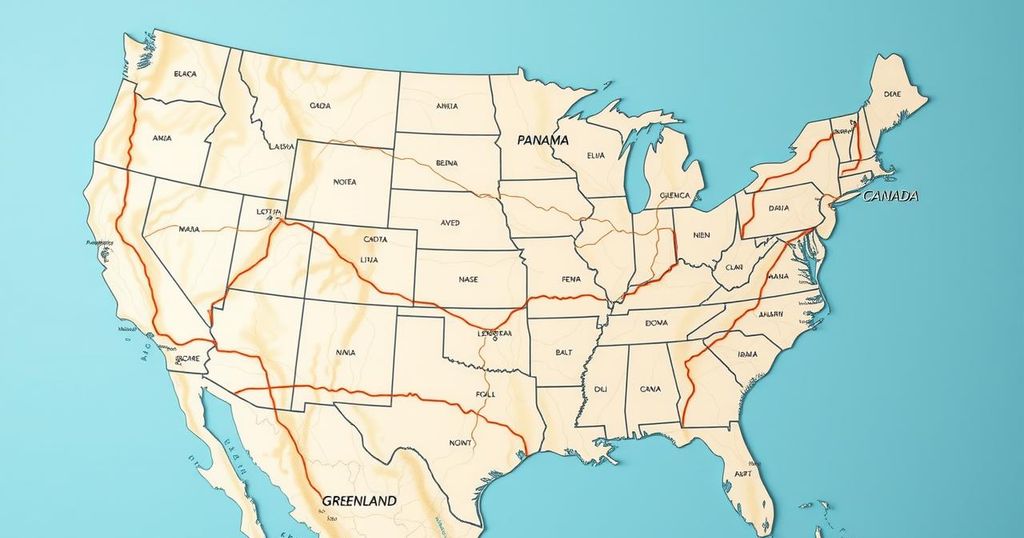President-elect Donald Trump has hinted at potential U.S. territorial expansions, suggesting the absorption of Canada, the acquisition of Greenland, and a threat to take over the Panama Canal. His comments combine genuine policy interests with rhetorical strategies to energize his base, drawing on historical frameworks of American expansionism. Responses from foreign leaders indicate significant pushback against these provocations, particularly regarding the sovereignty of Panama and Greenland.
In recent remarks, President-elect Donald Trump has sparked discussions around the potential expansion of U.S. territory, likening his ambitions to historical acquisitions such as the Louisiana Purchase and the acquisition of Alaska from Russia. He has suggested that the United States might consider absorbing Canada as the 51st state, along with resurrecting his interest in acquiring Greenland, a territory of Denmark, and even threatening to take control of the Panama Canal, once a U.S. asset.
Trump’s comments appear motivated by a blend of genuine aspirations and rhetorical strategies aimed at energizing his political base. His recent declaration to officials in Panama indicates a focus on the Panama Canal, suggesting that reduced tariffs for American shipping may prevent his proposed takeover. His rhetoric reflects an ideology reminiscent of Manifest Destiny, the historical belief in the U.S. divine right to territorial expansion.
Reiterating the importance of Greenland for national security, Trump categorized it as an “absolute necessity” and emphasized the significance of the Panama Canal as a “vital national asset.” Simultaneously, he has reiterated intentions to designate Mexican drug cartels as foreign terrorist organizations, which could potentially lead to military incursions into Mexico, raising concerns about diplomatic relations with a key U.S. trading partner.
Despite the provocative nature of his statements, Trump’s transition team has refrained from clarifying whether these ideas represent genuine policy ambitions or are merely intended to capture media attention. Some insiders suggest that recent discussions with allies and advisers may have fueled Trump’s interest in these international matters, particularly regarding trade outcomes.
The response from Panama’s President, José Raúl Mulino, has been emphatic. He declared that ownership of the canal is “not negotiable,” reinforcing the nation’s sovereignty over the territory after it was transferred from U.S. control in 1999. Additionally, Greenland’s leaders, including Prime Minister Mette Frederiksen, have dismissed Trump’s earlier and renewed interest in acquiring the territory, firmly asserting that it is “not for sale.”
While the suggestion of Canadian annexation seems to be more of a jest directed at Prime Minister Justin Trudeau, it underscores Trump’s approach to foreign negotiations, often characterized by unorthodox tactics that compel foreign leaders to engage with him. Overall, Trump’s provocations reflect a nationalist agenda and a willingness to challenge historical agreements and diplomatic norms.
The current commentary on President-elect Donald Trump’s flirtations with U.S. territorial expansion occurs against a backdrop of historical acquisitions like the Louisiana Purchase and the purchase of Alaska. These historic events highlight previous efforts to expand the United States’ geographic footprint for strategic and political reasons. Trump’s remarks on absorbing Canada, acquiring Greenland, and controlling the Panama Canal may reflect a broader ideological framework reminiscent of 19th-century Manifest Destiny, which championed American expansionism. Trump’s approach appears controversial, raising questions about existing international treaties, diplomatic relations, and domestic as well as foreign policy implications.
In summary, President-elect Donald Trump’s recent declarations regarding U.S. expansion evoke historical precedents of territorial acquisition, blending serious policy considerations with provocations designed to rally his support base. The mix of jest and potential policy agenda raises critical questions regarding U.S. diplomatic relationships, especially with Canada and Panama, and reflects a nationalist vision of America’s role in the world. Such statements arguably align with Trump’s broader “America First” rhetoric, drawing attention to his administration’s focus on national security and economic interests.
Original Source: www.cnn.com






